
Jul 12, 2019 12:00:00 AM
The other day I watched the documentary True Justice: Bryan Stevenson’s Fight for Equality.
Now if you don’t know who Bryan Stevenson is, you should check him out. I see him as our modern day Thurgood Marshall for his relentless efforts to disrupt injustice and inequality in the legal system.
This documentary was the bittersweet icing on the cake of a deeply reflective, emotional and powerful trip I’d taken to the Legacy Museum and National Memorial for Peace and Justice that was founded by Stevenson’s organization, the Equal Justice Initiative.
In exploring enslavement and its correlation to mass incarceration, Bryan hit on some points about America’s history of racism manifesting itself in the present, false and deflective narratives being used to overshadow the brutality and mistreatment of Black people, and how despite all of this, we have to believe in change. I found that these highlights also rang true for America’s history in educating Black people—and all of these points paint a picture of injustice, inequality and uphill battles for freedom.
This point about being haunted about our history is the realest talk!
Let’s be clear, America has never wanted Black kids to be educated. Just like Slave Codes made it illegal for enslaved Africans to learn how to read and write, practices in today’s public education system reek of discrimination and inequality and make it difficult for Black kids to get a good education.
Many Black kids are trapped in underperforming schools.
Jim Crow era laws have inspired people to create their own segregated school districts.
And for a country that preaches equality, why is it that kids in impoverished communities of color get less per pupil funding, lack access to high-quality teachers, rigorous classes and student support resources and programs?
I can go on with a number of infractions but the point is, history is repeating itself.
Listen, you cannot tell me that all lawmakers and teachers unions have the best interest of Black students and families in mind. Because instead of having a larger conversation about how to give Black kids the education they need and deserve, people are fighting to limit their options and access to quality schools.
Like in California, there’s been an ongoing fight against legislation that would limit the power and growth of charter schools but barely a whisper about how 68% of their Black students fail to meet ELA requirements.
People are calling for more accountability of charter schools when traditional public schools have been allowed to fly under the radar for years. I mean, don’t we want accountability for all schools?
Bottom line, these anti-choice pundits have been able to masterfully distract people from the real issue of the school system failing Black people. The problem isn’t charter schools, it’s this country’s unwillingness to really invest in our kids’ education.
Towards the end of the documentary, Bryan was reflecting on lessons he’d learned from his grandmother who was the daughter of enslaved people. He said:
“I think if my grandmother gave me anything, she gave me the confidence to believe things I haven’t seen.”
This quote really struck home for me. This is where the hope has to outweigh the outrage.
We’ve never seen a public school system that works for all kids but we have to believe we can build one.
That’s why it’s critical that students, families and advocates keep fighting for reforms. We need parents like Christina Laster. We need advocacy organizations like The Oakland Reach and The Memphis Lift. We need the BME Alliance because we know that our kids need more Black educators. We need the Margaret Fortunes who open schools that serve our communities. And we need networks like Education Leaders of Color that prepare and elevate us to become future leaders.
To sum it all up, Bryan hit the nail on the head with this:
“I don’t think we can get free until we can tell the truth about our history. Truth and reconciliation are important.”
We have to face our ugly history and its influence on the present. We have to heal and move forward with equality as a priority. Because if we don’t, liberty for all will continue to be a falsehood and generations of Black people will continue to suffer.
Tanesha Peeples is driven by one question in her work—“If not me, then who?” As the former Deputy Director of Activist Development for brightbeam, Tanesha merges the worlds of communications and grassroots activism to push for change in the public education system. Her passion for community and relentless mission for justice and liberation drive her in uplifting and amplifying the voices and advocacy of those that are often ignored. Tanesha wholeheartedly believes that education is the foundation for success. Her grand vision is one where everyone—regardless of ethnicity, socioeconomic status, gender or ZIP code—can have access to a comfortable quality of life and enjoy the freedoms and liberties promised to all Americans. And that's what she works towards every day.
Few issues in education spark more tension and debate than standardized testing. Are they a tool for equity or a burden on students? A necessary check on school systems or a flawed measure of...
Charter schools are public schools with a purpose. Operating independently from traditional school districts, they're tuition-free, open to all students, and publicly funded—but with more flexibility...
Despite the benefits of a diverse teaching force, prospective teachers of color fall out of our leaky preparation pipeline at every stage: preparation, hiring, induction, and retention. Here’s what...
Ed Post is the flagship website platform of brightbeam, a 501(c3) network of education activists and influencers demanding a better education and a brighter future for every child.
© 2020-2025 brightbeam. All rights reserved.
Leave a Comment